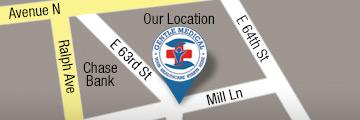What My Patients Should Know About Enlarged Prostate (BPH, Benign Prostatic Hyperplasia)
Posted by admin on July 18th, 2013

“As you age, your prostate will start to enlarge and may eventually cause problems. This generally begins to happen after age 40 and is very common. An enlarged prostate can eventually begin to put pressure on the urethra, causing difficulty with urination. While an enlarged prostate does not mean you have cancer, you should be seen for regular physical exams. If you are experiencing difficulties with urination, help is available. Many men are uncomfortable discussing their prostate and any issues it may be causing. You shouldn’t feel embarrassed- most men experience this issue at some point as they get older.
-Dr. Zimilevich, MD
What is the prostate and what does it do?
Your prostate gland is walnut-shaped. It sits at the base of your bladder just in front of the rectum. It surrounds the urethra, which is the tube that carries urine from the bladder to the outside of your body. It is made up of two lobes which are encased in a layer of tissue.
The prostate goes through two growth spurts, during puberty and again around age 25. Thereafter, it continues to grow at a slower rate. Approximately half of all men in their 60s and almost all men in their 70s and 80s have symptoms associated with an enlarged prostate.

What symptoms are caused by an enlarged prostate?
The symptoms of prostate enlargement are due to the pressure that the enlarged prostate places on the urethra. This results in urinary symptoms including:
- a weak, hesitant or dribbling urine stream
- urinary frequency (often worse at night)
- urinary urgency
- leaking or dribbling of urine
- inability to empty the bladder
In some cases, these symptoms do not present first; instead, you may suddenly find yourself unable to void (urinate) at all. This is called acute urinary retention and is an emergency.
What are the possible complications of prostate enlargement?
Some men will experience mild symptoms with an enlarged prostate, while others may experience more severe symptoms. A very enlarged prostate may cause urinary tract infection, bladder stones, damage to the bladder and kidneys due to urine backing up in the urinary tract and urinary incontinence (the involuntary leakage of urine).
What can I expect when I come in for an exam?
Whether or not you are experiencing symptoms related to an enlarged prostate, you should be coming in for a prostate exam every year after age 40. The prostate exam is often done as part of a yearly physical. In order to judge the size and contours of the prostate gland, a digital rectal exam is required.
I may also recommend a PSA (prostate-specific antigen) blood test. PSA is a protein that is made by the cells of the prostate. The PSA level may be elevated if you have cancer of the prostate. It is important to know that not all enlarged prostate glands are enlarged because they are cancerous; however, cancer is a possibility when the prostate is enlarged. It is also important to know that the PSA can be elevated for other reasons besides cancer. For example, an enlarged prostate can cause the PSA to be elevated, as can infection of the prostate gland. Although a PSA can be useful, it is not the only piece of information we use to diagnose prostate cancer.
If I am concerned that you may have prostate cancer, I will likely refer you to a urologist, who is an expert on prostate cancer.
What treatment is available for an enlarged prostate that is causing urinary symptoms?
If your symptoms are mild and not particularly bothersome, I may recommend no treatment other than keeping a close eye on the situation through regular checkups.
If your enlarged prostate is causing urination problems that pose a danger to the health of your urinary tract, or your symptoms are very inconvenient, there are medications that I can prescribe that can improve your symptoms. These medications can help to shrink the prostate, or at least stop it from growing any further. Some medications target urinary symptoms, helping to relax the bladder and improve urine flow.
If medication therapy fails to improve your symptoms, a visit to a urologist may be warranted. I can arrange a referral to a urologist if this occurs.
If you are experiencing symptoms that you think may be due to an enlarged prostate, or are due for a prostate exam, don’t delay because of embarrassment- help is available. All you have to do is make an appointment.
Our Location

6301 Mill Lane, Brooklyn, NY 11234.
(718) 942-4600



